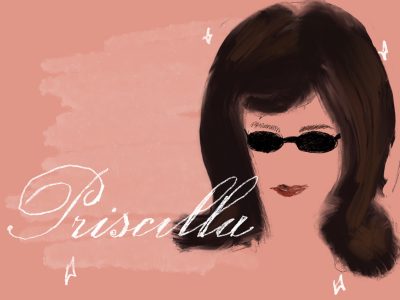It appears that 2023 has become the year for the female gaze in cinema.
Feminine rage, mystique, beauty –– all things that director Sofia Coppola is known for executing distinctly and masterfully. 
Adapted from Priscilla Presley’s 1985 memoir “Elvis and Me,” Coppola brings a blush-pink Americana wonderland to the screen. The natural move is to compare this biopic to Baz Lurhmann’s “Elvis” film, released summer 2022. But “Priscilla” stands boldly, and quite divinely, on its own.
Priscilla Beaulieu, played by Cailee Spaeny, first encounters Elvis Presley, played by Jacob Elordi, in September of 1959 when she is invited to a soirée at Elvis’s rental home in West Germany. Priscilla, or “Cilla,” is merely a high school freshman when inaugurated into the hearthtrob’s dazzling universe, a verity that Coppola presents to the audience bluntly.
Their juvenile love starts rather innocently, sharing flirtatious desires and giddy movie dates, all as Elvis charms Priscilla with his novel lifestyle. While other school girls are spending their evenings toiling over studies, Priscilla is partying with Elvis and his of-age entourage.
The two’s dynamic becomes clear soon after their introduction. When Elvis talks, he knows Priscilla will listen. While of course she is entranced by his being, it is quite early on established that Beaulieu is a gentle soul who captivates a hurting Elvis, especially following the passing of his mother.
Priscilla becomes Elvis’s guidepost, her delicate poise a magnet for the superstar in desperate need of blind compassion. It is no secret he is troubled from early on in his career –– diluting the all-consuming pains of super stardom with prescription pills on the regular –– a habit which Elvis later shares with a teenage Priscilla as she begins struggling in school.
Rather than acting as a caricature of Elvis Presley, Elordi focuses on establishing Presley’s essence through an ambiguously masculine and enchanting portrayal. He represents the quieter, domestic side of Elvis that other modern interpretations often shy away from acknowledging to such an extent. Elordi proves that often less is more, as his grounded performance juxtaposes Austin Butler’s previous Elvis, which comparatively bears a likeness to any Las Vegas strip impersonator.
This take, although far less flashy, is refreshing and allows for Priscilla to control her own narrative. Thus it is no longer an admirer’s romanticized tale of the ‘King of Rock n’ Roll,’ rather simply the story of a young girl falling madly in love.
Along comes 1960 and Elvis is honorably discharged from the war, subsequently heading to Memphis, Tennessee to return home to his Graceland mansion. He and Priscilla are sprung into a yearlong separation, full of both yearning and whispers of illicit affairs as Elvis’s Hollywood reputation only grows. Meanwhile, Priscilla embraces her bittersweet teenage daydream, patiently awaiting Elvis’s calls and counting down the days before she next sees him.
On the contingency that she excels in her studies, Priscilla moves out to Graceland to finish out high school and begin a life with her famed lover. But Graceland slowly turns from an uncharted paradise into a haven of excess, no longer remnant of the dream that once existed for a bright-eyed Priscilla. The two soon begin sharing a last name, establishing the Presley presence throughout Memphis and the realm of tabloid headlines.
Cailee Spaeny’s performance as Priscilla is subtle, like the film itself, however incandescent. Spaeny’s striking appearance on camera allows for her transformation into Priscilla Presley to appear all the more seamless, particularly as she grows older and evolves into her classic public image: jet black teased hair and cat-winged liquid eyeliner, an image meticulously curated by Elvis and his team.
“Priscilla” is effortlessly feminine –– capable of entertaining all yet speaks boldly to its female audience. Sofia Coppola has a gift, the ability to write a female lead as striking as she is vulnerable, as sensual and beautiful as she is profoundly feeling and intellectual. It is no marvel as to why Priscilla Presley herself entrusted Coppola the responsibility of bringing her story to life on screen.
Priscilla’s crowning moment is her liberation from Graceland’s opulent gates, a solo drive away to Dolly Parton’s “I Will Always Love You.” Hair down and bare faced, the new mother accepts a life beyond the Presley name. She is forever Priscilla, not just a Presley — and Coppola forever secures her legacy as such.